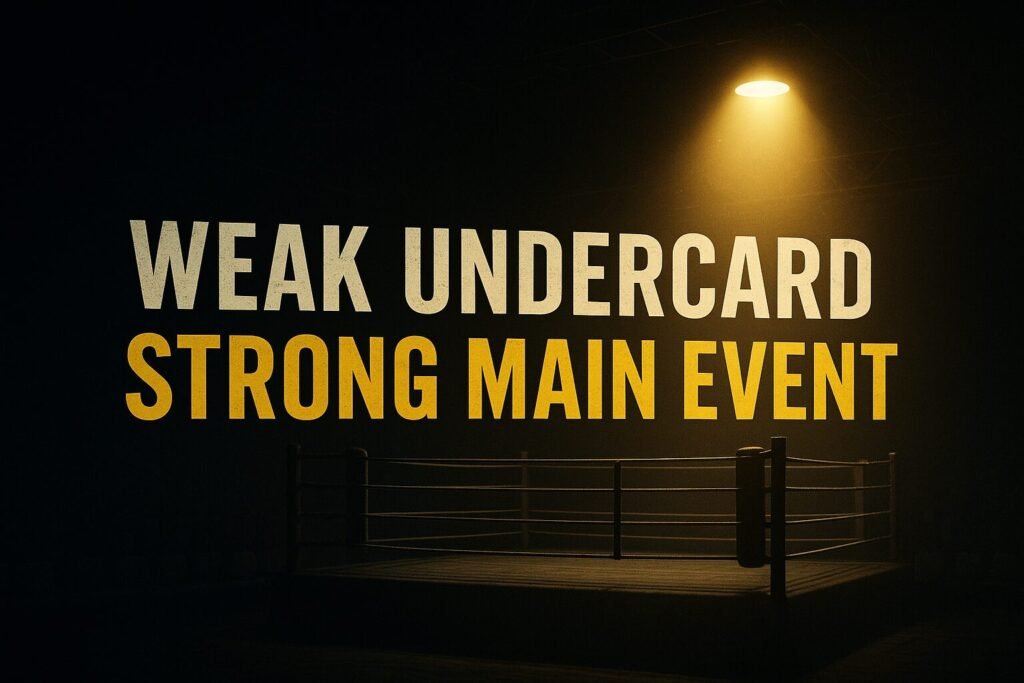One Big Fight, Thin Surroundings
Let’s be honest — the Eubank Benn 2 undercard isn’t exactly inspiring confidence. Scroll down the bout list and you’ll struggle to find more than one genuinely competitive match-up. That’s a problem, especially when you’re asking fans to fork out forty or fifty quid for the privilege of watching it.
This isn’t about the main event — that sells itself. The Eubank–Benn rivalry is one of British boxing’s most marketable stories, a generational sequel that still sparks debate decades after their fathers’ legendary encounters. We’ve already broken down the narrative in our full rematch coverage and analysed what this fight means for both men’s legacies in Legacy vs Hype. But for a show this size, fans deserve more than just one headline act.
Remember When the Undercard Mattered?
There was a time when British pay-per-view cards felt like full nights out. The 2010s had genuine event-building — a mix of domestic title fights, European-level showdowns, and a sprinkling of prospects in real tests. Think back to the cards built around Froch–Groves II, or even early Joshua nights at the O2. The undercard meant something.
Now, the sport seems to have slipped into a lazy formula: one blockbuster main event, one half-relevant title bout, and several ‘prospect showcase’ fights where everyone already knows the outcome.
As we discussed in our previous piece on pay-per-view undercard problems , this decline isn’t just about money — it’s about effort. Promoters have stopped seeing undercards as opportunities to tell stories. Instead, they treat them as filler. And once fans get used to filler, it becomes the norm.
Why Fans Keep Accepting Less
So why do fans still buy in? Part of it is emotional investment — and promoters know it. They lean on nostalgia, name value, and media hype to keep the numbers rolling. The Eubank Benn 2 undercard is the perfect example: most people buying the fight aren’t doing so because of the support acts. They’re doing it for the main event.
That emotional pull is powerful. The story’s been years in the making, from the failed 2022 fight to all the chaos that followed, including the rehydration clause controversyand the bitter back-and-forths that fuelled the rivalry. Promoters know the name sells itself — so why risk money on deeper support bouts?
But that short-term logic damages long-term trust. Eventually, even the most loyal fans start asking: What am I actually paying for?
How Promoters Can Fix It
If British boxing wants to rebuild value, it starts with balance. Every major pay-per-view needs at least two meaningful fights beneath the headliner — ones that could headline smaller shows on their own. Not every slot has to be a title fight, but every fight should matter.
Give fans a reason to tune in early. Bring back domestic title clashes. Pair big names with credible opponents instead of token opposition. If promoters can’t afford deeper cards, then the solution isn’t to charge fans more — it’s to rethink how these events are structured.
The Eubank–Benn saga has already proven there’s appetite for British blockbusters, as seen in the post-fight reaction to their first meeting. Imagine how much bigger these shows could feel if the whole card carried that same energy.
Final Bell: Fans Deserve Full Value
Boxing fans aren’t asking for miracles — just fairness. If you’re selling a night of fights, then give us a night of fights. The Eubank Benn 2 undercard should have been a celebration of British boxing depth, not a reminder of how far standards have slipped.
Maybe it’s time we, as fans, start demanding more than just the main event. Because if we keep accepting less, the sport will keep offering less.
Enjoyed this piece?
Share your thoughts below or on social media — what’s the last undercard that actually impressed you? Visit CMBoxing.co.uk for more honest takes, deep dives, and weekly boxing commentary that pulls no punches.

